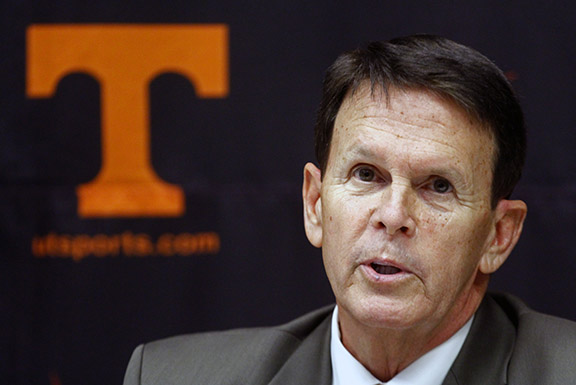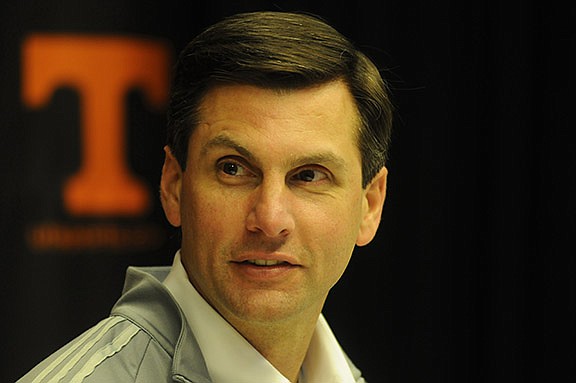Sometime in December of this year, Derek Dooley will receive a final check of $104,167 from the University of Tennessee. It's about the same amount Dooley has received every month since the Volunteers parted company with Vince's kid at the close of the 2012 season.
Read that again. For the past four years, Dooley has been receiving a check a month for more than a hundred grand not to coach the Vols. Call it the Big Orange Parachute.
In light of Monday's news that retiring - or should that be resigning - athletic director Dave Hart will receive more than $640,000 for his first year off the clock, isn't it time, if not waaaay past time, for UT to quit paying former athletic department employees not to do their jobs?
 Tennessee athletic director Dave Hart speaks to reporters at a news conference on Sunday, Nov. 18, 2012, in Knoxville, Tenn., after it was announced that head football coach Derek Dooley would be replaced by offensive coordinator Jim Chaney for the final SEC regular season game against Kentucky. (AP Photo/Wade Payne)
Tennessee athletic director Dave Hart speaks to reporters at a news conference on Sunday, Nov. 18, 2012, in Knoxville, Tenn., after it was announced that head football coach Derek Dooley would be replaced by offensive coordinator Jim Chaney for the final SEC regular season game against Kentucky. (AP Photo/Wade Payne)In the beginning, in the not so long ago autumn of 2008, it didn't seem all that unreasonable for former football coach Phillip Fulmer to be paid $6 million over four years after he was controversially let go at the close of his 16th full season as the head coach.
After all, Fulmer had won one national championship, two Southeastern Conference titles and 70 percent of his games. Fulmer's a Hall of Famer, not a Hall of Shamer, even if then-AD Mike Hamilton wasn't the only one frustrated with the direction of the program at that point.
Some of the other buyouts are far harder to justify, however, including the soft landing of $1.3 million orchestrated by Hamilton for himself when he departed Volsville at the close of the 2011 school year.
Add to that Bruce Pearl, who cheated, then lied about it to the NCAA, yet still received a $948,000 buyout. Also don't forget baseball coach Todd Raleigh - another of Hamilton's hiring gems - who walked away with $331,000 to help ease him into unemployment.
Then there's Dooley, whose $5 million buyout after three losing seasons is still on the books, as well as various sums paid to his assistants, which are believed to be in the $3 million range.
Add it all up - close to $17 million minimum - and you might understandably come away with the overwhelming belief that never before in the history of college athletics have so many been paid so much to accomplish so little.
Especially when you consider that with Hart at the helm, UT has also paid in the neighborhood of $4.5 million in settlements and legal fees for athletic-related lawsuits over the past 24 months.
That means the past eight years of bad decisions by those who should know better come to a conservative $21 million lost to coaching and administrative buyouts and lawsuit settlements. That also means something desperately needs to change going forward now that Hart is stepping aside.
This isn't to say that nothing Hart has done is worth repeating. Much as his son Rick built a solid foundation at the University of Tennessee at Chattanooga from which his successor David Blackburn could soar, Daddy Dave has, on balance, made the UT athletic department a far better place during his five years there.
For starters, he didn't hire Dooley. He just happened to be the one who swiftly understood the need to fire him. Hart did hire Donnie Tyndall, however, which meant he was also forced to fire the serial NCAA violator after less than a year on the job as head basketball coach.
Hart also completed the merger of the men's and women's athletics, which was a financial necessity but which needed to stop there regarding the Lady Vols brand, which carried with it far more dignity and character than the many of its male counterparts - as well as more on-field success.
And had he done that, had Hart not angered and agitated Lady Vols loyalists, had he understood the depth of their love and pride in the Lady Vols name not only in women's basketball but across the spectrum of UT women's athletics, he might not be dealing with what is most assuredly a forced retirement that will pay him $642,000 in 2018 not to work rather than the $800,000 he would have made had he worked until the end of the 2017-18 school year. That was the final year of the contract extension he signed in 2013.
Yet because of Hart's successes with football coach Butch Jones, men's basketball hire Rick Barnes (who replaced Tyndall), a dramatic rise in the academic performance of UT's student-athletes and a suddenly secure financial picture, replacing Hart with someone better may be more difficult than many believe.
No less than Barnes told 247Sports regarding Hart's departure: "The one thing I think we would like to see as coaches is stability. You don't want to go backwards. I certainly hope that doesn't happen here, because I think there's some great things here. I think Dave has truly - and his staff with him - has done an unbelievable job of solidifying this program, and we've got to move forward with that kind of stability."
He's right. When, with Hart's exit, you will have had three ADS, four football coaches and four men's basketball coaches since 2008, nothing may be needed more within the UT athletic department than stability. But the best way to obtain that stability is to quit hiring coaches and ADs - but especially coaches - you have to pay not to work.
Contact Mark Wiedmer at mwiedmer@timesfreepress.com.
